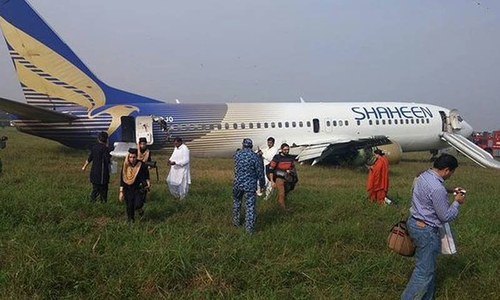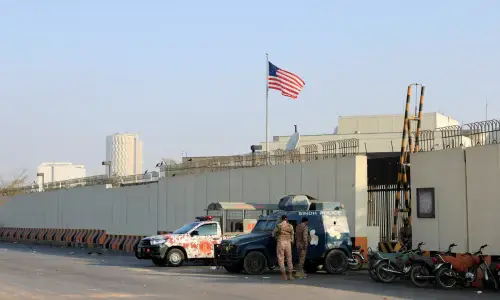LAHORE: Police registered a case on Sunday under the anti-terrorism act against the pilot of the Shaheen Air flight that crashlanded in Lahore on Nov 3.
At least 10 passengers were injured when a Shaheen Air International flight crash landed at Allama Iqbal International Airport earlier this month. The pilot of the aircraft was not only fatigued but was also under the influence of alcohol, the acting director general of the Civil Aviation Authority (CAA) told Dawn on Thursday.
Read: Aircraft escapes crash in Lahore
Lahore's Deputy Inspector General (DIG) Operations Dr Haider Ashraf told Dawn on Sunday that a case was filed at the Sarwar Road police station against the pilot under Section 7 of the Anti-terrorism Act (ATA).
The DIG said that the pilot was taken into custody after a team of Punjab police was sent to Karachi to arrest him.
Read editorial: Crash-landing
CAA’s acting director general Amjad Toor had announced on Thursday that the crew would have to undergo snap and random medical tests before operating a flight. He said the tests would be conducted as a precautionary measure and to ensure that such incidents did not recur.
Mr Toor directed airline representatives to ensure that their pilots met the highest level of aviation standards and refrained from flying under the influence of alcohol.
Meanwhile a statement issued by CAA's Public Relations Manager Pervez George said that "As per the Pakistan Civil Aviation Rules (CAR) approved by The Government of Islamic Republic of Pakistan, No Alcohol level is acceptable in the blood of any Pilot, cockpit crew, cabin crew and passengers."
The statement added, "However, Federal Aviation Authority USA permits the blood alcohol level up to 40mg per deciliter. The medical investigation reports of cockpit crew of M/s Shaheen Air International flight no. NL-142 just after the incident revealed that the pilot in command had unacceptable level of blood alcohol and lactate. The lactate indicates that the pilot was fatigued and had been drinking alcohol."
"It is further stated that the Alcohol Level in the blood sample of the pilot in command of M/s Shaheen Air International flight No. NL-142, was 83 mg per deciliter which was more than the double of the permissible amount by the Federal Aviation Authority (FAA), USA. Since the amount of alcohol was doubled of the permissible amount by FAA, USA. It had affected the central nervous impairment and also lead the pilot towards errors of judgment."
Previously, a Pakistan International Airlines pilot who was under the influence of alcohol was caught in the United Kingdom minutes before the flight. He confessed, served a jail term there and was also sacked by the airline.
































